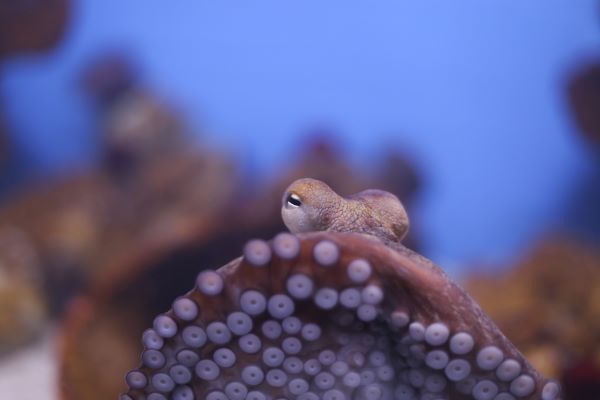To mark World Octopus Day (Sunday 8 October), 76 NGOs, scientific experts and public figures around the world have united to call on the Canary Islands government to reject plans to build the world’s first commercial octopus farm in Gran Canaria, Spain.
NGOs including Compassion in World Farming, Greenpeace Spain, Eurogroup for Animals, Oceana UK, SeaLegacy and experts – such as Peter Singer and Jennifer Jacquet – have joined forces to send a letter to the Canary Islands government urging them to reject a planning application by company Nueva Pescanova to build an octopus farm in the Port of Las Palmas. The letter explains that allowing the farm to go ahead would cause animal cruelty, environmental damage and may negatively impact the islands’ communities and tourist trade.
In 2021 Compassion in World Farming published a report, Octopus Farming: A Recipe for Disaster, which showed that octopuses’ exceptional characteristics make them uniquely unsuitable for intensive farming. The report reviewed the scientific evidence and revealed how octopuses are solitary in nature and generally live and hunt on their own. Confining them to underwater tanks could lead to aggression or even cannibalism.
In March 2023, the NGO published a second report with Eurogroup for Animals – Uncovering the Horrific Reality of Octopus Farming, a report – which reviewed the plans for the proposed farm where the company plans to rear approximately one million octopuses every year, producing 3,000 tonnes of octopus meat. The plans confirmed the NGOs’ fears, revealing disturbing practices such as the use of ice slurry for slaughter – a method scientifically recognised as causing cruelty.
Over the last three years, international opposition to octopus farming has soared with numerous NGOs, animal welfare experts, environmentalists, conservationists and politicians expressing their outrage at plans to confine these unique animals in underwater farms. Washington State in the USA has proposed a Bill banning octopus farming, and the UK has legally recognised cephalopods as sentient beings. Hawaiian authorities have closed the Kanaloa octopus farm and, in Canada, a governmental petition was proposed to ban octopus farming.
Elena Lara, Research Manager at Compassion in World Farming and author of both reports, said:
“This World Octopus Day, we should be celebrating these unique, fascinating, and intelligent wild animals rather than planning ways to exploit them for profit by confining them in underwater factory farms. It’s time to end factory farming – not expand it.
“They belong in our oceans, not in farms. They are sentient creatures that feel pain, suffering and distress, just like other animals. Not only would farming them be cruel and unnecessary, it would also be unsustainable and damaging to our oceans. They would need to be fed wild-caught fish in captivity – a practice that would contribute to overfishing and food insecurities in already vulnerable communities around the world.
“We strongly urge the Canary Islands authorities to do the right thing and reject these cruel and environmentally damaging plans to farm octopuses once and for all. And to reiterate this message, supporters all over the world will be making their own views known by taking part in a coordinated social media action this World Octopus Day aimed at the Canary Islands government.”
Thousands of people are expected to take part in the action this Sunday. They will send their own messages to the Canary Islands government by following the hashtag #StopOctopusFarming and tagging them @PresiCan on X/Twitter, @gobcanarias on Instagram, or PRES.Gobcan on Facebook.









